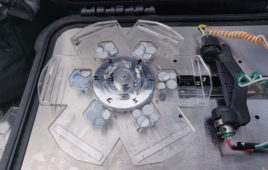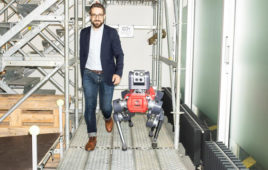A small start-up is set to turn the market for hand prostheses on its head – with an innovative spirit, compact DC motors, and a touch function.
 Opening the door is only the first of many challenges. A human hand encloses the handle, depresses it, and moves flexibly. In comparison, an electromechanical hand prosthesis is stiff. When the door moves, this results in large forces acting upon individual fingers. “This is why a good prosthesis needs to be made of high-quality materials and components,” Stefan Schulz says, with conviction. He is the founder and CEO of Vincent Systems, a start-up with ten employees in the German city of Karlsruhe. When it comes to hand prostheses, Stefan Schulz is an expert. He built his first electromechanical prosthesis in 1999 while he was still working at the Karlsruhe Institute of Technology (KIT). Ten years later, he moved into the private sector.
Opening the door is only the first of many challenges. A human hand encloses the handle, depresses it, and moves flexibly. In comparison, an electromechanical hand prosthesis is stiff. When the door moves, this results in large forces acting upon individual fingers. “This is why a good prosthesis needs to be made of high-quality materials and components,” Stefan Schulz says, with conviction. He is the founder and CEO of Vincent Systems, a start-up with ten employees in the German city of Karlsruhe. When it comes to hand prostheses, Stefan Schulz is an expert. He built his first electromechanical prosthesis in 1999 while he was still working at the Karlsruhe Institute of Technology (KIT). Ten years later, he moved into the private sector.
Currently, the third generation of prosthetic hands by Vincent Systems is available. “It’s lighter and more compact than other models and basically weighs the same as a human hand,” Schulz explains. The smallest version is even suitable for children – its youngest wearer is only eight years old. The special thing about these hands is that they’re bionic. This means that each individual finger is actively driven by a DC motor, and the thumb is driven by two. The motors are installed directly in the fingers and thumb, which makes it possible to replace digits individually. There is something else making the Vincent Systems hand so special: It’s the first commercially available prosthetic hand that delivers feedback about grip strength to its wearer. This is achieved with short pulses of vibration. If the hand were to vibrate evenly, a person would quickly get used to the sensation and stop paying attention to it.
Stefan Schulz knows that the task he and his colleagues have set themselves will never be complete. As an engineer, he wants to develop a mechatronic hand prosthesis that imitates the human hand as closely as possible. “But it no matter how many innovations we come up with, compared to the human original it will always be a compromise. The product will never be perfect; it can always be improved.” However, this doesn’t discourage him. On the contrary, it motivates him in his daily work, and it may be one of the secrets behind the success of Vincent Systems. During the short span of the company’s existence, the engineers completely revised the prosthetic hand several times, taking into the account feedback by users of the prosthesis and trying new technological approaches. Hearing Stefan Schulz speak, it seems that this wasn’t a big deal. As an engineer, he obviously feels comfortable in his field of expertise.
Read more in the latest issue of „driven“.
Filed Under: maxon Driven




